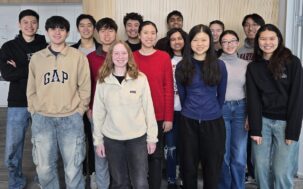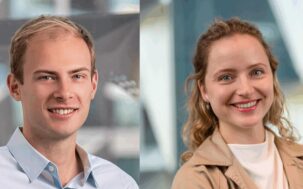CAMBRIDGE, MA —Professor George Alvarez has been a familiar face at the Kempner over the past two years as an affiliate faculty member, but this semester the institute is excited to welcome him in a new role as a full-time visiting scholar. On sabbatical from his faculty position as Fred Kavli Professor of Neuroscience in the Department of Psychology, Alvarez will spend the spring semester at the Kempner, pursuing new research directions at the intersection of computer vision and visual neuropsychology.
“We are delighted that George Alvarez is our first internal visiting scholar. As one of our earliest associate faculty members, he has helped to launch some of our key educational programs,” said Kempner Institute Executive Director Elise Porter. “We are excited he decided to spend his sabbatical with us, building new connections in the community. We’re looking forward to the ideas and innovations that spring from his presence here. ”
While his permanent office at William James Hall is just across the river in Cambridge, Alvarez says being here at the Kempner for his sabbatical offers a unique opportunity to participate more actively in the interdisciplinary collaboration that the institute offers. Over the course of the semester he will work closely with other members of the Kempner community, including research fellows Binxu Wang and Thomas Fel, to advance promising research projects. One focus will be a project that involves using deep neural network models to generate images that can then be used to probe neurons in real monkey brains and test theoretical hypotheses about how they enable visual processing.
“I think this sort of collaboration would be impossible without the Kempner Institute,” says Alvarez. “It’s rare to have so many skill sets and resources in the same place, enabling us to move rapidly from idea to model to experimental testing, and then iterate on that. Nothing like this existed at Harvard before the Kempner.”
Alvarez explains that the Kempner has already played a role in advancing the work of the Vision Sciences Laboratory, which he co-directs along with Kempner associate faculty member Talia Konkle. The lab studies the algorithms underlying how both humans and artificial systems see the world. ”Our team has weekly meetings at the Kempner where we do a hackathon and try to push the project forward in little bursts,” he says. “Then the next day the neural recordings happen, and we have fresh data to work with.”
Over the next semester, as a visiting scholar, Alvarez plans to engage with an even wider cross-section of researchers at the Kempner to pursue new research directions and advance existing projects even further.
“The Kempner’s mission is so aligned with what our lab is trying to accomplish,” says Alvarez. “It’s exciting to be fully immersed in the institute this semester, at a place that is bringing all these people together. I’m looking forward to the collaboration, to learning from the community, and to accelerating this research forward.”
About the Kempner Institute
The Kempner Institute seeks to understand the basis of intelligence in natural and artificial systems by recruiting and training the next generation of researchers to study intelligence from biological, cognitive, engineering, and computational perspectives. Its guiding principle is that natural and artificial forms of intelligence share important characteristics. Future innovations in artificial intelligence (AI) will take inspiration from the principles that our brains use for fast, flexible natural reasoning. In parallel, theories developed for AI will enhance our understanding of how our brains compute and reason. Join the Kempner mailing list to learn more, and to receive updates and news.
PRESS CONTACT:
Deborah Apsel Lang | (617) 495-7993 | kempnercommunications@harvard.edu







